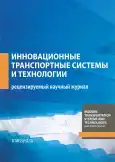Digitalization of railway station complexes
- Authors: Nikonova Y.I.1, Proskuryakova E.A.2
-
Affiliations:
- Siberian Transport University
- Emperor Alexander I St. Petersburg State Transport University
- Issue: Vol 8, No 3 (2022)
- Pages: 31-44
- Section: Original studies
- URL: https://bakhtiniada.ru/transj/article/view/109989
- DOI: https://doi.org/10.17816/transsyst20228331-44
- ID: 109989
Cite item
Full Text
Abstract
Background: Digital railway is the most important global trend in the development of railway transport. “Smart station” is part of the digital railway concept. Currently, there is no unambiguous solution to the problem of how to introduce advanced information technologies to improve the efficiency and level of service of the railway transport system in the station complexes. The construction of new and reconstruction of existing station complexes in accordance with the concept of “smart station” is also relevant for Russian railways.
Aim: identify priority areas for the development of station complexes; to characterize the main measures for the digitalization of the management system of railway stations of Russian Railways.
Materials and Methods: in the course of the study, a systematic approach, analysis, synthesis, methods and tools for statistical data processing were used: tabular method, methods for calculating average and relative values, methods for analyzing dynamics. Activities for the digitalization of station management systems were evaluated on the basis of methods for evaluating the effectiveness of investment projects in the field of railway transport. The information base consists of the works of domestic and foreign scientists in the field of digitalization of railways, the development of railway stations, as well as strategic documents of Russian Railways: Long-term program for the development of railway stations of the Directorate of Railway Stations – a branch of Russian Railways for the period up to 2025; The concept of efficient use and development of railway stations for the period up to 2030; Development strategy of the Russian Railways holding for the period up to 2030; Long-term development program of Russian Railways until 2025.
Results: the world trends in the development of station complexes are considered; clarified the essence of the category “smart station”; the characteristics of the main directions of digitalization of the station complexes of Russian Railways are given.
Conclusion: the concept of “smart station” is the basis for changes in the organization of the activities of station complexes being implemented in modern conditions. The introduction of digitalization contributes to an increase in the efficiency of all types of activities of the station complexes of Russian Railways.
Full Text
##article.viewOnOriginalSite##About the authors
Yana I. Nikonova
Siberian Transport University
Email: ya_shka@list.ru
ORCID iD: 0000-0001-6331-4371
SPIN-code: 3827-3955
Candidate of Economic Sciences, Associate Professor
Russian Federation, NovosibirskElena A. Proskuryakova
Emperor Alexander I St. Petersburg State Transport University
Author for correspondence.
Email: eaprosk@gmail.com
ORCID iD: 0000-0002-5892-1297
SPIN-code: 8593-3057
Candidate of Economic Sciences, Associate Professor
Russian Federation, St. PetersburgReferences
- Zhuravleva NA, Poliak M. Architecture of managing big data of mixed transportation of passengers in aglomerations. In: IOP Conference Series: Materials Science and Engineering, Volume 918, VIII International Scientific Conference Transport of Siberia, 2020. 22-27 May 2020, Novosibirsk, Russia; 2020. doi: 10.1088/1757-899X/918/1/012055
- Zemp S, Stauffacher M, Lang DJ, Scholz RW. Generic functions of railway stations. A conceptual basis for the development of common system understanding and assessment criteria. Transport Policy. 2011;18(2):446-455. doi: 10.1016/j.tranpol.2011.02.001
- Zhuravleva NA, Wright J, Michalkova L, Musa H. Sustainable urban planning and internet of things-enabled big data analytics: Designing, implementing, and operating smart management systems. Geopolitics, History, and International Relations. 2020;12(1):59-65. doi: 10.22381/GHIR12120204
- Zhuravleva NA, Nica E, Durana P. Sustainable smart cities: networked digital technologies, cognitive Big Data analytics, and information technology-driven economy. Geopolitics, History, and International Relations, 2019;11(2):41-47. doi: 10.22381/GHIR11220196
- Lyakina M, Sheehy M, Podhorska I. Networked and Integrated Urban Technologies in Internet of Things-enabled Smart Sustainable Cities. Geopolitics, History, and International Relations. 2019;11(2):62-68. doi: 10.22381/GHIR11220199
- Youd F. The digitalisation of railway: Kryptonite for the industry? Railway Technology [Internet]. 2022 Jun [cited 2022 Aug 25]. Available from: https://www.railway-technology.com/sector/infrastructure/
- Schrage M, Kiron D, Hancock B, Breschi R. Performance management’s digital shift. MITSloan Management Reviev [Internet]. 2019 Feb [cited 2022 Aug 25]. Available from: https://sloanreview.mit.edu/projects/performance-managements-digital-shift
- Kazanskaya L, Proskuryakova E. Improvement of work of urban public transport based on passenger traffic simulation. Urbanism. Architecture. Constructions. 2021;12(1):5-12.
- Zhuravleva N, Guliy I, Shavshukov V. Simulation modeling of changes in demand for rail transportation. In: IOP Conference Series: Earth and Environmental Science, Volume 403, XII International Scientific Conference on Agricultural Machinery Industry 10–13 September 2019, Don State Technical University, Russian Federation; 2019. doi: 10.1088/1755-1315/403/1/012230
- Dimeery I, Baraka M, Ahmed SM, et al. Design and Construction of Smart Cities: Toward Sustainable Community; Conference proceedings; 2021 February, Springer; 2021. 394 p.
- Li D, Yang X, Xu X. A Framework of Smart Railway Passenger Station Based on Digital Twin. In: CICTP 2020; 20th COTA International Conference of Transportation. 2020 Aug 14-16; Xi’an, China pp. 2623-2634. doi: 10.1061/9780784482933.226
- Ohyun J, Kim Y-K, Kim J. Internet of things for smart railway: feasibility and applications. IEEE Internet of Things Journal. 2018;5(2):482-490. doi: 10.1109/JIOT.2017.2749401
- Namiot D, Pokusaev O, Kupriyanovsky V. On railway stations statistics in Smart Cities. International Journal of Open Information Technologies. 2019;7(4):19-24.
- Shaltout RE. Key Challenges of Smart Railway Station. In: Design and Construction of Smart Cities, Toward Sustainable Community; January 2021. p. 287-294. doi: 0.1007/978-3-030-64217-4_33
- Bubelíny O, Kubina M, Varmus M. Railway Stations as Part of Mobility in the Smart City Concept. Transportation Research Procedia. 2021;53:274-281. doi: 10.1016/j.trpro.2021.02.039
Supplementary files








